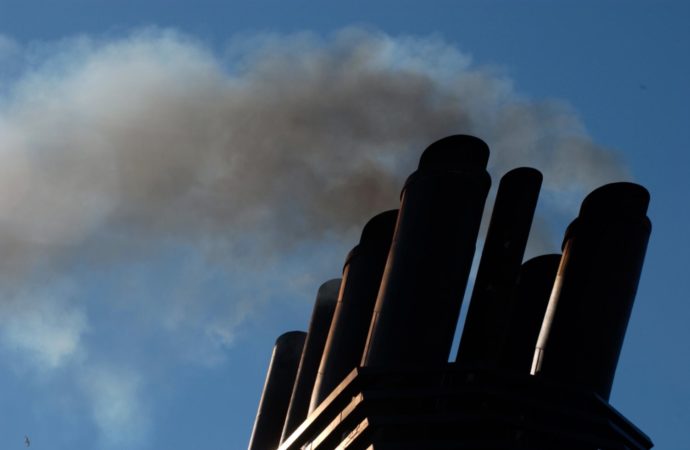Letter: Fuel Industry must work to reduce shipping’s black carbon and CO2 emissions
Clean Arctic Alliance Responds to Industry on Black Carbon in New Shipping Fuels
London, Monday 10 February 2020:- Responding to last week’s collective and individual responses from the co-authors of the Joint Industry Guidance on “The supply and use of 0.5% -sulphur marine fuel” including IBIA, Concawe and others, the 18-member Clean Arctic Alliance has published an open letter to industry requesting that not only should individual organisations and companies take responsibility for ensuring that their fuels to not lead to further pollution, but that they should actively work to limit the climate impact from global shipping.
“We believe that at a time when the climate crisis is topping political agendas worldwide, and every sector is being set targets to reduce carbon dioxide and black carbon emissions, it would be unparalleled folly for the marine fuel sector to develop and market a product that takes black carbon emission reductions in the opposite direction. ”
The letter continues to say that “we believe the members of the marine fuel industry have a professional duty to alert the appropriate authorities at both national government level and at the IMO, when a situation arises where members were developing fuel types that would contradict established policy efforts to reduce black carbon”.
“What is crucial is that every possible effort is made to ensure the shipping industry reduces its climate impact and that new fuels contribute to this objective and not work against it.”
The letter concludes with three requests:
- Will you work with us to ensure that all fuel parameters and data that are likely to affect emissions are made public, and in the case of fuels that are still in development before they are brought to market?
- Will you work with us to ensure that no new fuel placed on the market results in increases in black carbon or other air pollutants?
- Will you work with us to expedite measures to reduce clack carbon emissions from the burning of existing fuels?
ENDS
Contact: Dave Walsh, Communications Advisor, Clean Arctic Alliance, [email protected], +34 691 826 764
Notes:
Correspondence:
Letter from Clean Arctic Alliance to industry, 10 February 2020
https://www.hfofreearctic.org/wp-content/uploads/2020/02/Response-Letter-to-JIG-sponsors_10Feb2020.pdf
IBIA, 31 January 2020: Open letter to Dr Prior, Clean Arctic Alliance
https://ibia.net/open-letter-to-dr-prior-clean-arctic-alliance/
Concawe, 29 January 2020: Concawe comments on the Clean Artic Alliance(CAA)Open Letter published on 23 January 2020 (sic) https://www.concawe.eu/wp-content/uploads/Concawe-comments-on-CAA-Open-Letter-29.01.2020.pdf
Lloydst List: Refiners and industry hit back at accusations of VLSFO impact on black carbon emissions
https://lloydslist.maritimeintelligence.informa.com/LL1130861/Refiners-and-industry-hit-back-at-accusations-of-VLSFO-impact-on-black-carbon-emissions
Splash 24/7: Shipping bodies respond to black carbon claims
https://splash247.com/shipping-bodies-respond-to-black-carbon-claims/
IBIA replies to Clean Arctic Alliance in open letter on black carbon emissions
https://www.manifoldtimes.com/news/ibia-replies-to-clean-arctic-alliance-in-open-letter-on-black-carbon-emissions/
Original Clean Arctic Alliance communication: 27 January 2020:
Oil companies must explain how their new “Super Pollutant” shipping fuels ever came to market https://www.hfofreearctic.org/en/2020/01/27/oil-companies-must-explain-how-their-new-super-pollutant-shipping-fuels-ever-came-to-market/
Letter from the Clean Arctic Alliance to co-authors of the Joint Industry Guidance on “The supply and use of 0.50%-sulphur marine fuel” https://www.hfofreearctic.org/wp-content/uploads/2020/01/Letter-from-Clean-Arctic-Alliance-to-Joint-Industry-Guidance-sponsors_24012020.pdf
Joint Industry Guidance The supply and use of 0.50%-sulphur marine fuel, 20th August 2019
http://www.ipieca.org/news/jip-sulphur-marine-fuel/
Submissions to the International Maritime Organization’s PPR7 meeting (17-21 February 2020)
Initial results of a Black Carbon measurement campaign with emphasis on the impact of the fuel oil quality on Black Carbon emissions
Initial results of a Black Carbon measurement campaign with emphasis on the impact of the fuel oil quality on Black Carbon emissions.
Submitted by Germany and Finland, 15 November 2019
https://imoarcticsummit.org/publications/imo-papers/ppr-7-8-initial-results-of-a-black-carbon-measurement-campaign-with-emphasis-on-the-impact-of-the-fuel-oil-quality-on-black-carbon-emissions/
The need for an urgent switch to distillates for ships operating in the Arctic
Submitted by FOEI, WWF, Pacific Environmentand CSC, 27 December 2019
The need for urgent action to stop the use of blended low sulphur residual fuels leading to increases in ship-source Black Carbon globally
Submitted by FOEI, WWF, Pacific Environment and CSC, 27 December 2019
Further reading:
International Council on Clean Transportation, Greenhouse gas emissions from global shipping, 2013–2015
https://theicct.org/publications/GHG-emissions-global-shipping-2013-2015
IMO Submission: Consideration Of The Impact On The Arctic Of Emissions Of Black Carbon From International Shipping: Greenhouse gas emissions from global shipping 2013-2015
https://www.hfofreearctic.org/en/2017/12/01/greenhouse-gas-emissions-from-global-shipping-2013-2015/
About the Clean Arctic Alliance
The following not-for-profit organisations form the Clean Arctic Alliance, which is committed to a ban on HFO as marine fuel in the Arctic:
Alaska Wilderness League, Bellona, Clean Air Task Force, Green Transition Denmark, Ecology and Development Foundation ECODES, Environmental Investigation Agency, European Climate Foundation, Friends of the Earth US, Greenpeace, Iceland Nature Conservation Association, Nature And Biodiversity Conservation Union, Ocean Conservancy, Pacific Environment, Seas At Risk, Surfrider Foundation Europe, Stand.Earth, Transport & Environment and WWF.
More more information visit https://www.hfofreearctic.org/

